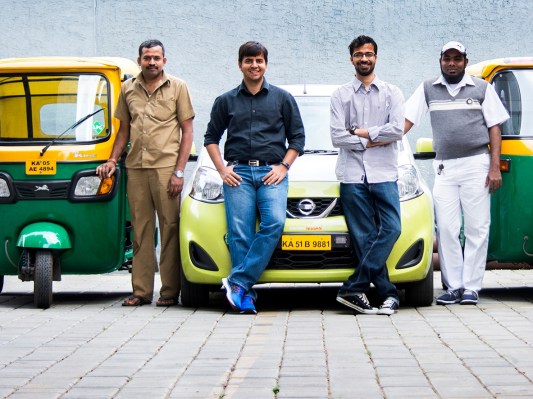The rumors are true, India’s Uber rival/potential-future-M&A-buddy Ola has acquired transportation startup Ridlr in an undisclosed deal.
Mint reported the imminent transaction last week, describing it as a fire sale, and today Ola confirmed the deal. The terms are undisclosed so you can make of that what you will.
Update: A source with knowledge of the acquisition told TechCrunch the transaction is an all-stock worth close to $50 million which is certainly a higher figure than most had assumed based on the previous reporting.
Founded in 2010, Ridlr operates as a personal transport portal that allowed users buy tickets for public transport in 17 Indian cities and also monitor traffic congestion using IOT devices. The company had raised over $6 million from investors that include Qualcomm Ventures, Times Internet, Matrix Partners (which is also an Ola backer.)
Ola isn’t saying too much about how it plans to use Ridlr other than that the deal will “bring new technology and mobility options as [Ola] works to expand into and partner with cities in India and abroad.” The company already offers a range of ride-sharing options, bike-sharing, food deliveries and a mobile wallet, but it plans to give more color on the proposed new services in the next month or so.
In its deal scoop, Mint claimed Ridlr will help improve Ola’s navigation and potentially see it add public transport booking options. That might sound at odds with a ride-hailing app, but when you consider that many people use buses or trains for the bulk of their commute and a taxi to get to their final destination, the move could help Ola own the “end-to-end” journey in full. At the least, that’s a strategy that Uber hasn’t explored and that potential alone — to be a differentiator — might make it worth a look.
Ridlr will continue to operate as an independent business “for now,” an Ola representative told TechCrunch, who also clarified that it will become a wholly owned subsidiary of Ola parent Ani Technologies.
Albeit seemingly not an expensive one, this deal marks Ola’s seventh investment.
The largest outlays have been rival TaxiForSure for $200 million in 2015 and FoodPanda India last December which relaunched its food delivery business. Other deals have included taxi radio service Gcabs.in, trip-planning service Geotagg and payment startup Qarth. The firm also made a minority investment in Zipcash.
Despite today’s news, the larger story around Ola is whether it will merge with Uber in the same way that the U.S. firm recently struck a deal with Grab to exit money-losing market Southeast Asia.
Uber CEO Dara Khosrowshahi has said that there will be no more global retreats — Uber previously struck exit deals in China and Russia — but there has been constant press speculation and reports of an ongoing dialogue between Uber and Ola over a potential deal. Unlike China and Southeast Asia, sources at Uber believe that the company’s India-based service is ahead of the local rival so don’t feel the need to push for consolidation.
But there are other factors.
As was the case with Grab and Didi, Ola counts SoftBank as an investor and, since it landed an investment in Uber, the Japanese firm has been pushing for Uber to do deals in unprofitable markets and focus on more lucrative countries in the West. The issue is particularly acute since Uber is reportedly targeting an IPO as soon as 2019 and it would need to get its finances in line accordingly.
Nonetheless, Ola is already branching out overseas via a recent launch in Australia and, publicly at least, it is committed to being around for “decades.”
“In India’s transformative digital journey, Ola will always be an active and integral part for decades to come. SoftBank and all other investors are committed in realizing this ambition. Ola is always actively looking for opportunities for expansion of its footprint,” the firm told TechCrunch in a statement.
